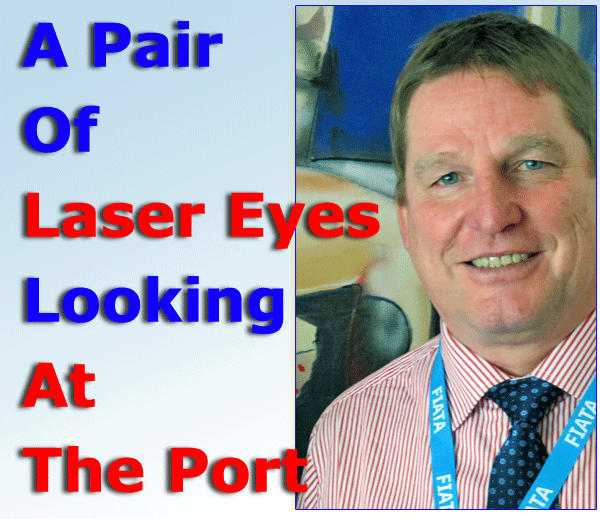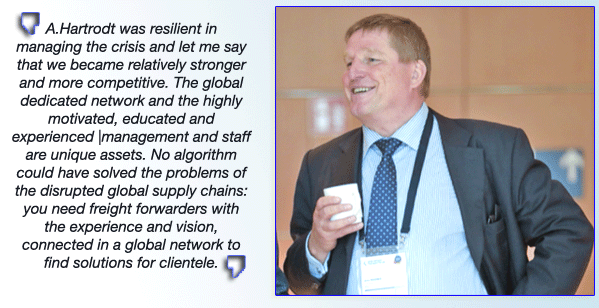 |
Jens Roemer, Chair of the Working
Group Sea (WGS) of FIATA, is a person on the go: Jens
and I checked the first part of this interview from his parent’s
house in Hamburg, Germany, his hometown, during a short break. The rest
was done whilst he was travelling back to Antwerp, where he lives and
works.
Looking at Jens’s eyes you cannot
miss his laser glance, most inquisitive, yet somewhat cool, never embarrassing.
Jens told me he is six years from retirement, not sure he will be going
back to Hamburg then. Considering what we have seen since he took the
WGS in charge, there is still plenty of time to make an impact between
shippers and forwarders on one side and forwarders and liners on the other
before he leaves. Let us hear this maritime industry expert talk about
his experience and plans.
Jens Roemer, turned sixty on June 18th,
is German, married with three children. A
very straightforward record occupies the beginning of his life: Abitur,
the Army, Diploma in the ’80’s and the “Speditionskaufann”
training, the paramount door-opener to any German logistics company, then
an MBA, what else? Much earlier, in October 1982 A. Hartrodt (GmbH&Co),
Hamburg decided to bank on the promising 21-year-old and opened its doors
to him. He still works at Hardtrodt in 2021, next year it will be his
40 years’ jubilee.
In 1985 Jens packed his bags and worked
outside of Hamburg: Frankfurt first and a couple of year later –
leave the capsule if you dare – Singapore, Malaysia, Philippines,
Thailand, Indonesia and Vietnam. Until 9/11 WOW meant windows of the world,
surely Jens Roemer did not miss any of that. In 2000 he returned and settled
in Antwerp with functions spanning over Europe. In fifteen years’
activity in Asia Jens also had pivotal roles in local associations, with
important international functions. In the ’90’s he became
deputy Chairman of the Singapore association, with responsibilities in
ASEAN and regional bodies, also teaching at the local Institute for Technical
Education. His engagement with the Belgian Freight Forwarders’ Association
is now 20 years old. This led Jens to FIATA, where he was elected in the
Extended Board in 2013, the same year taking over as Chair of the WGS.
Here is a recap of the long and interesting conversation with Jens Roemer.
FT: As
a well-travelled professional executive you have lived in Europe and in
the Far East. Were you homesick or was it for family reasons that you
decided to return?
JR: I
was not really homesick. Wherever you are in the world there is always
something nice to enjoy and being a social person I enjoy cultures, religions,
food; this is a big gift, a bit sad now that we cannot travel much. Staying
abroad is amazing how close you get to other cultures. I still have very
many friends in Singapore. Singapore was home for me for 13 years. All
three kids were born in Singapore. Antwerp is home now and that is a place
where I live comfortably, but my postings have been of a lengthier period,
thus giving me time to really get to know and appreciate the places and
cultures. I may retire in Antwerp, but never say never . . .
FT: Has
the pandemic experience changed your approach in business, during and
after the pandemic, professionally? And in your private life?
JR: This
is a tough question. I appreciate social contacts, meetings, etc. it has
been a terrible period, not being able to socialize is really hard for
me. I should however not complain too much, as I enjoyed a reasonably
high threshhold for managing the crisis. Changes . . . when it comes to
business, the effect on the supply chain is what means change: as freight
forwarders we did a lot to keep it up and running. Looking at the disrupted
supply chains, the pandemic accelerated digitization. Container bookings
for example: now everyone expects this on line. In principle it should
be more efficient, but the environment is less proactive. Disruptions
and changes happen constantly and follow-up emails and phone calls have
exploded. Albeit not so efficient, emails have become the main business
tool, more than ever before. With shipping lines, getting the right person
on the phone is difficult.
I am proud of our team, always ready to
go the extra mile for our customers, yet the dichotomy in delivering a
so-so product, not perfectly satisfied you cannot get better service.
Without you it would even be worse. We have tried to support our customers
in a moment of uncertainty, when their confidence was waning. Looking
at the human side, people feel the frustration. Despite the support from
the hierarchy we can only hope our employees count on their stamina. Even
with the boost in digitization, we need to consider and respect the human
capital, which is essential.
In my private life I have the privilege
of an understanding environment: much of the stress at work was mitigated
when I resorted to my family. As I speak, my wife is driving and I can
take your questions, this is a real help!
FT: What
has waterborne transport shown during the pandemic? We have read many
upsetting headlines concerning maritime transport, blank sailings, shortage
of containers, rolling of boxes, sailings becoming almost unreliable.
Do you think this is just due to the pandemic or is it the extension of
a tendency that started earlier on, and if so why?
JR: Nobody
should be surprised for the situation we have lived. If shipping lines
ask for a high price now there is nothing to complain about: it is a free
market. My shareholders expect me to maximize my profits and the shipping
lines are doing the same, we are all in the same boat, we must all face
the same market with its ups and downs. But how could we have allowed
this market to develop itself in this manner? Above all the regulators,
the FMC, the EU and Chinese institutions all have been witnessing nine
major shipping lines, an already relatively limited number, organizing
themselves in just three alliances: now there are only three sticks to
choose from.
The wind of mergers and acquisitions has
been blowing at full force for years and nothing was done, or could be
done to change. This is how we were left with just half of the landscape
we had before. Liners can legally arrange and adjust their sailings, within
the agreements that have been approved. The question on whether this adjustment
is made to meet the market demand, or falls short of doing so, is open
with no effective answer so far. With bigger and bigger vessels, the market
is anyway restricted. On EU/Far East some nine vessels should meet the
requirements of how many thousand customers? On the other hand, this is
not a cheap ride. You need a big investment if you wish to come into this
trade. Nobody can enter the market now, as the investment is too big for
newcomers. Ports go out of their way to get the big vessels as these make
big numbers. Vessels became bigger and bigger, it seemed to make sense
back then, but the landside did not meet the challenge. In higher peaks,
the landside cannot cope: there are not enough drivers and chassis. All
are working at their limit: if anything goes wrong, e.g. the pandemic,
well, that is/was the tick that made the system collapse. Congestion was
bound to happen: one cannot be surprised.
Still I honestly do not think that we could
have predicted the pandemic outbreak and the consumers’ behaviour
that has been triggered. The tsunami came onto everyone in the business,
with few exceptions. The shrinking number and dimension of the shipments
arrived at a moment when ships were the largest ever, sailings and callings
were shrinking in favour of the containment of costs. The impact on the
frequency of services was then abnormal and there were months of total
bewilderment in the market. Now we are on the other side of the hill,
with containers and ships stuck in congestion, we try to run services
despite some 20% capacity drops. Forwarders can pave the way to new agreements,
but they cannot be expected to absorb any kind of pain without comments.
 |
FT: Should
there be an industrywide campaign to correct the trends we observe in
the sector, or some other form of coordinated effort led by FIATA? Or
should governments look into the industry? What would be the message?
JR: We
all know the role of international organizations is vital but limited;
we may not expect UN institutions to exceed their mission either, but
perhaps the regulators (at least the most powerful such as the FMC and
DG COMP in the EU) should have acted differently and tried to control
the snowballing size of the ships. There is room to reconsider certain
approaches. CLECAT is strongly lobbying the EU and we must bring these
issues to the regulators’ attention (e.g. Demurrage and Detention
rules recently published by FIATA). The open question is whether it is
already too late. We have desired and created a free market and we must
not flatter ourselves that we could lobby a free market to suit our requirements.
We can lobby institutions, not the market. In this light, the shipping
lines will be in the driver’s seat for at least the next two years.
Profits will be invested in vertical integration, i.e. canvassing more
and more services to compose a wider portfolio of services.
Unfortunately, freight forwarders are not competing
at the same level. Liners seem to place themselves ahead of forwarders
also in data sharing and they benefit from subsidies that forwarders fail
to see. This is an area where FIATA’s help will be crucial. Forwarders
need to be proactive to define a new relation with shipping lines and
shippers. With a proactive and efficient data exchange, we could decide
what to do on arrival in Antwerp when loading in China, long before the
ship comes in. As we see in the news, there is another burning issue:
disaster prevention. The CTU code is important: incidents are invariably
due to inappropriate loading and lashing. Perhaps we could use the CTU
code by reference in our contracts: we are specialists in loading containers
and we can surely be of assistance. Am I daydreaming? Shipping lines are
not keen to listen, but we are always trying.
FT: What
are you most looking forward to doing, both business and personally, as
restrictions ease and COVID finally recedes? Have you already planned
your next business trip? Will you travel extensively again?
JR: If
all of a sudden I had no restriction and no obligations, I would pack
the car with some vitals and drive, just drive to each and every friend
and relative I have not been able to meet in the last two years. I am
more than sure that my wife and children would be willing to come with
me and share the same feeling. I am sorry for the airplane, but I need
to feel free to drive where and when I want without any sort of restriction
right now. Daydreaming?
FT: Are
you tired of zoom, webinar and other web-driven contact? Or will you make
that medium a go to form of contact and communication?
JR: Let
me be short and direct on this one. Zoom and other virtual paraphernalia
have been good, even precious and will remain an asset. No idea where
we would be today if we had had no support on this side, but nothing can
replace personal contacts. I think we shall slowly come back to that,
perhaps less frequently. As I said before I am deeply social: you cannot
fight your own nature.
FT: In
your contact and communications what have you experienced that impacted
and impressed you the most? Is anything in the dreadful experience we
have lived to be saved, or just to forget as fast as possible?
JR: I
was surprised that most of us adapted to a new situation with relatively
few disruptions. IT infrastructure was more robust and people more resilient
than we had thought. Whatever we do next I do not think this experience
will be easily or soon forgotten. We learnt how important our collective
health is and how fragile our certainties are: public health is serious
business and we need to address it conveniently.
FT: How
do you expect your company to emerge during the rest of 2021? Can you
feel the respect and encouragement? Name the highs of course, but also
what can we all do better?
JR: A.Hartrodt
is strong and I am doing my best to keep it in that shape, in the face
of the current uncertainties. As I said we must be able to develop a closer
relationship with our customers. In my view there is the key for our future
business. Overall A.Hartrodt was resilient in managing the crisis and
let me say that we became relatively stronger and more competitive. The
global dedicated network and the highly motivated, educated and experienced
management and staff are unique assets. No algorithm could have solved
the problems of the disrupted global supply chains: you need freight forwarders
with the experience and vision, connected in a global network to find
solutions for clientele. Last but not least, our financial strength has
proven to be a chief asset, with the financial exposure created by freight
rates spiralling tenfold, payable upfront in the spot market!
FT: Coming
to FIATA, are you happy of the move to Geneva? Quite an achievement for
the Secretariat in the period we have been going through, correct?
JR: Moving
in this period was quite a challenge and pushing this forward against
all odds has been brave. All went well and we may rejoice now. Clearly
there was a bit of luck in the accomplishment. Members will have time
now to absorb the changes and decide whether they are happier now. Of
course the change is more noticeable now that the registered office has
moved, but the evolution had started a few years back. In the end FIATA
is just human resources and the global network. The global network has
moved closer together. Today you need to fight for a single container
at a time, with communication running across continents, yet closer than
ever before. Understanding the situation on both sides has developed as
never before. This was possible due to the human resources’ evolution
in the organization.
FT: We
know you have had considerable experience in motivating your staff. What
would you tell a young woman to persuade her to enter the transport and
logistics sector, in light of your career experience. Is there any special
feature that makes logistics appealing for a young lady, in your view?
JR: Easy
one . . . I have had so many wonderful female colleagues, with really
inspiring personalities. Historically logistics had never been for males
only, in particular in ’70’s and ’80’s many women
came to pretty high places in freight forwarding. In Asia there have always
been many more women, e.g. in the Philippines the scene is nearly only
for women even today. This being said, in recent times women have been
perhaps attracted by other areas: finance, insurance, learning. Perhaps
it has to do with the relatively higher salaries in finance and insurance,
with a more flexible employment of time. CLECAT is proficiently managed
by Nicolette van der Jagt, and that is a good example. I try to be as
close as possible to people, regardless of hierarchy and gender, I make
no differentiation. All this being said, logistics is the ideal arena
for women, where their organizational skills can shine in the proper light.
Marco Sorgetti
|




